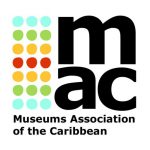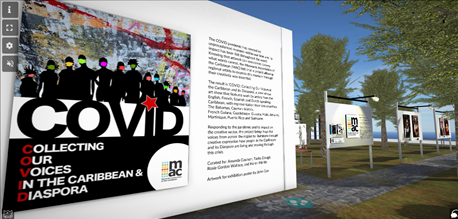MAC COVID VIRTUAL ART EXHIBITION
In Spring 2021, MAC will launch its first exhibition. Titled Collecting Our Voices in the Caribbean and the Diaspora (COVID), the exhibition is a virtual product with live projections around the region planned for later in the year. The concept developed rapidly during a convening last summer, between a group of MAC board members, general members, and stakeholders to envision the future of the Caribbean’s creative ecosystem in the midst of the global pandemic. Amanda Coulson, outgoing director at the National Art Gallery of the Bahamas and founding director of TERN Gallery, sees the show as an opportunity for the Caribbean to increase control over its own cultural narratives. The Western stereotype of the region as a single, homogenous vacation destination eclipses ongoing artistic achievements, but COVID subverts that conception.
For Coulson, COVID is “all about generating content from here. How can we talk about [COVID-19] and how it’s been experienced in all of our island nations, from here.” The art world marginalizes creatives working outside of cities like Berlin, London, and New York, and Coulson laments the commodification of artists beyond the Western sphere of influence. While there are historical, political, and financial forces at play, the idea behind COVID is asking, “How do we build those things here… so that artists from [Caribbean] countries can be represented by their own people?”
The current COVID steering committee includes Coulson; Natasha Dougé, mixed media artist; Rosie Gordon-Wallace, founder and curator of Diaspora Vibe Cultural Arts Incubator; Dr. Joanne Hyppolite, president of the Museums Association of the Caribbean (MAC); Koren Martin, photographer and museum administrator; and Natalie Urquhart, director and chief curator at the National Gallery of the Cayman Islands. Previous members include Arminda Franken-Ruiz, Caribbean heritage specialist and former director and curator at the National Archaeological Museum of Aruba, and John Cox, visual artist. Through their connections to art and culture in the region, committee members are intimately aware of the vibrant work being made daily.
Though the talent in the Caribbean is undeniable, proficiency in the global business of creativity is not as common. From drafting contracts to writing an artist statement, “there’s so much to building a[n artistic] practice that’s administrative,” Coulson says. Regardless of where they work, few artists are taught those skills. Instead, they rely on their networks to learn and grow. The lack of structure in the Caribbean relative to major Western markets means Caribbean artists are even less likely to be exposed to these norms and are disadvantaged when promoting their work. COVID is one of many ways to professionalize the field by strictly adhering to application guidelines during the selection process. Submissions needed to meet high standards beyond aesthetics and craftsmanship.
Out of over 70 artists who submitted, the committee chose 27 finalists from the Dutch, French, English and Spanish-speaking Caribbean. The exhibition will be multilingual as well. Without a doubt, expanding access to shows like “COVID” only strengthens the field. Coulson is direct: “Good art can come from everywhere. People can have ideas about art no matter where they live.”
The online show is now live via the Museums Association of the Caribbean website. For more information, see the exhibition press release.
Written by Kara Bledsoe

